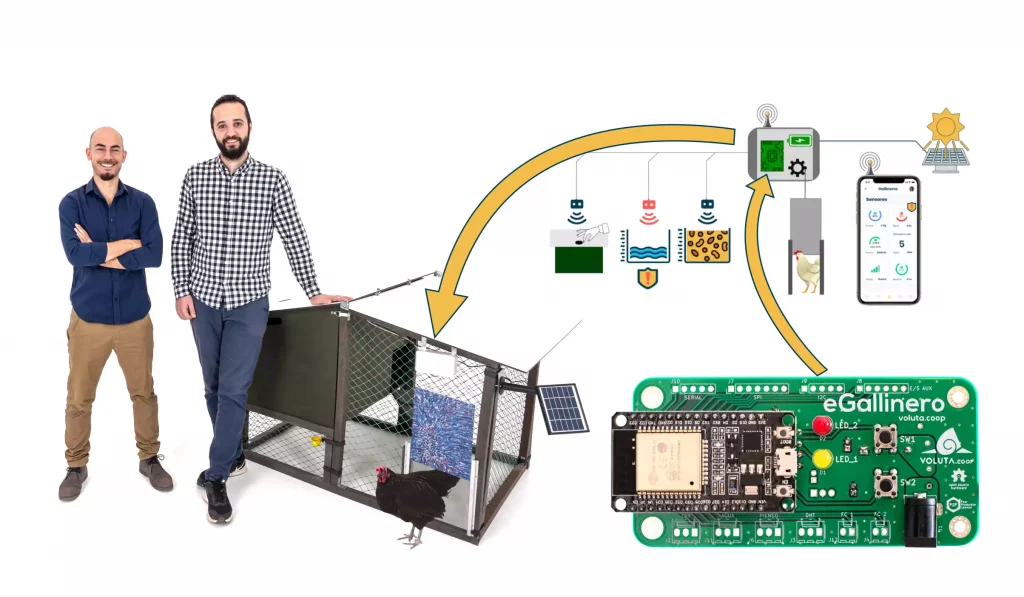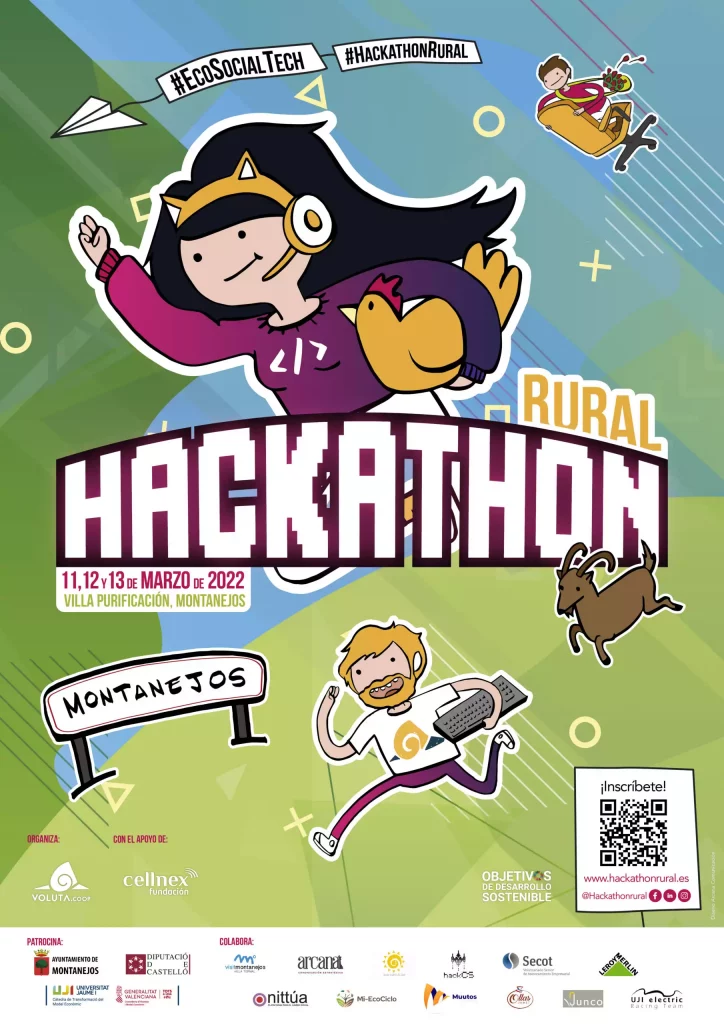Trends
Trends
JUN
14
2022
Spain
The “internet of chickens” to regenerate rural areas
Connecting rural and urban areas to mitigate the digital divide, hollowed-out Spain and our disconnect with the natural environment are the cornerstones of voluta.coop, one of three start-ups that took part in the first edition of the Cellnex Bridge accelerator for inspiring social impact projects.
Reflections on life prompted by the pandemic and the oppressive feeling of lockdown motivated the founders to abandon the security of their steady jobs to set up a cooperative with the idea of using technology and know-how to revitalise an ever-more appealing rural world.
With a background in engineering and a passionate vocation for the countryside, they lent their talent to sensor projects for Smart Cities and robotisation at a well-known household appliance multinational until they decided to change course in life to align their values and personal growth with a professional challenge with a social and environmental purpose.
“We were shut in during the pandemic in a small flat overlooking an inner courtyard and it was a really cathartic experience for us. We are both passionate about the rural world and, weary of business as usual, and so we thought of starting up a project to connect the rural and urban worlds”, explains in an interview Áxel Pena López, half of the beating heart of the project, sponsored by the Cellnex Foundation.
Tired of prevailing green posturing and aware of the importance of individual engagement to reconnect with nature and restore ecosystems, mental and physical health, biodiversity and awareness, they began to conceptualise their idea through two educational resources.
“Rurban”, a small chicken coop made with recycled materials that can be dismantled and transported and is easy to access and install for schools, care homes, community spaces (co-working and co-living), camping, companies… and an IoT (Internet of Things) technology kit with free software and hardware that connects users to the activity and life of the chicken coop.
“With the chicken coop we generate and revitalise communities. We produce on site, as a team, we link up curriculum content for natural and social sciences and art, and we foster self-consumption and occupational therapy projects for the elderly and people with functional diversity”, Áxel explains.
“The OpenIoT Kit offers a practical and enjoyable way to teach digital skills with open applications. The data sensoring modernises and enhances the experience with the chickens, monitors the level of feed or water, opens and closes the door of the hen house automatically, keeps count of the eggs, and so on.”
Unlike other technological experiences that isolate the individual and dissolve communities, the OpenIoT device revolves around notifications in a Telegram group for those who participate. “The chicken coop becomes a meeting point for that community”.
After selling their first chicken coops, the two partners decided to register the cooperative formally in mid-2021, coinciding with the creation of the Cellnex Foundation and its first major project: Accelerating start-ups with a positive impact that help ensure that no one is left disconnected in an increasingly digitalised society.
“Cellnex Bridge has definitely been the most helpful milestone for us since we started. It helped us build a business line and validate it. But that’s not all – we have gained a great deal from it in other lines and continue to do so. Although the program has finished, the mentors are still by our side and continue to advise us. For us that has tremendous value”, explains Áxel.
But the connected chicken coop is just a gateway to a very ambitious goal, embodied in the #EcoSocialTech Manifesto: “using the formidable power of technology to diversify the economy by modernising traditional sectors, help repopulate rural areas and reconnect people with nature.”
As part of this ambition, with a focus on tackling youth depopulation, they held their first #RuralHackathon, a training and collaborative sessions supported by Cellnex to “plant digital seeds, bring technological knowledge to rural youth, diversify the economy and retain and attract talent.”
“Technology helps, but you can’t eat or breathe it” were the inspiring words used by this small-scale initiative to introduce its concept of applied knowledge in the town of Montanejos in Castellón, where some 20 participants aged from 15 to 22 interacted over a period of three days in the first rural Hackathon with 15 mentors (including the Director of the Cellnex Foundation, Àngels Ucero) and five technological resources.
The call proposed three very specific solutions for the town: a project to modernise the traditional clay pot irrigation system for truffle growing by applying IoT; another self-sufficient irrigation system using solar energy and recycled rainwater; and a management platform to help people who are elderly and/or have some degree of dependence connect with appropriate service providers for their needs.
This activity, after which almost half of the participants said they expected to work in a small town, is intended to be the first of many experiences to seek creative solutions that connect the traditional needs and problems of the towns with the capacity of the technology to solve them.
In fact, voluta is accepting new sponsors to carry out 15 Rural Hackathons in areas affected by rural depopulation until 2025 with the initiative that they have coined as the “Rural Hackathon Challenge”. The ambition of these meetings is to use cooperation and training to encourage 500 young people born in the 2000s, the Z Generation, to put down roots.
The cooperative has just launched another initiative for which they are also looking for new clients. This is a pilot project aimed at companies committed to talent to improve the mental health of their workers, boost the rural economy and at the same time donate resources and training workshops to social action projects.
The initiative is called “Chickens to the rescue” and it is a social project in which teams of workers cooperatively build “Solidarity Chicken Coops” to donate them to educational and social action projects, either in Spain or abroad, through Development Cooperation in emerging countries.
“We want to explore synergies between the neglect suffered by the Spanish rural environment and that suffered by the emerging countries of the global south, and generate empathy between both worlds,” explains Áxel. “These workshops will be held both in Spain and in the community of Kunika Zambia (the first collaborating NGO) and the result of them (manufacturing of Chicken Coops), in addition to leaving an educational legacy in both countries, will allow Kunika Zambia to promote an innovative and hygienic solution for self-consumption of quality proteins, such as fresh chicken eggs”.


















